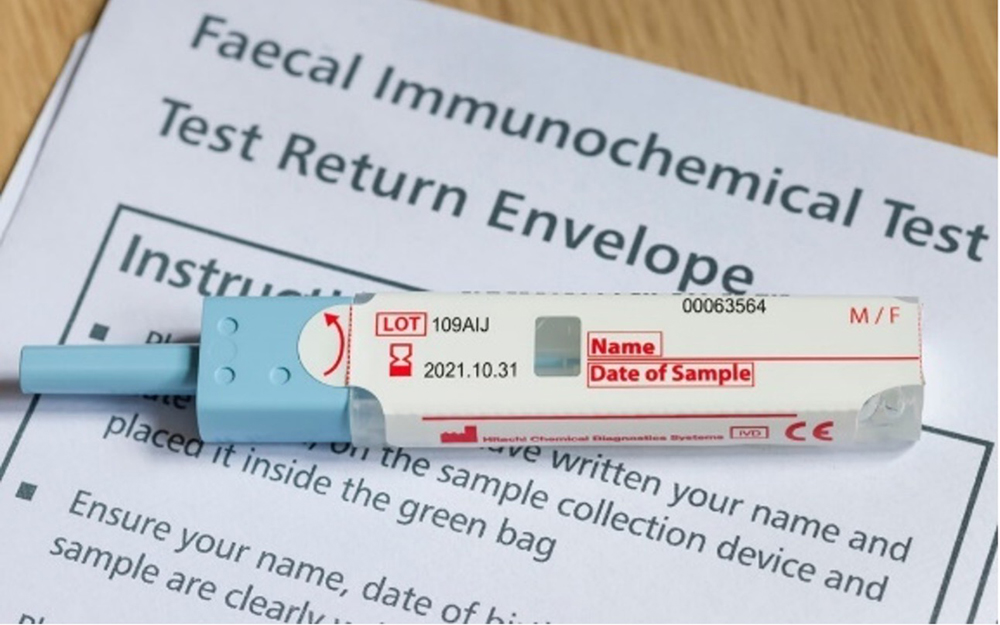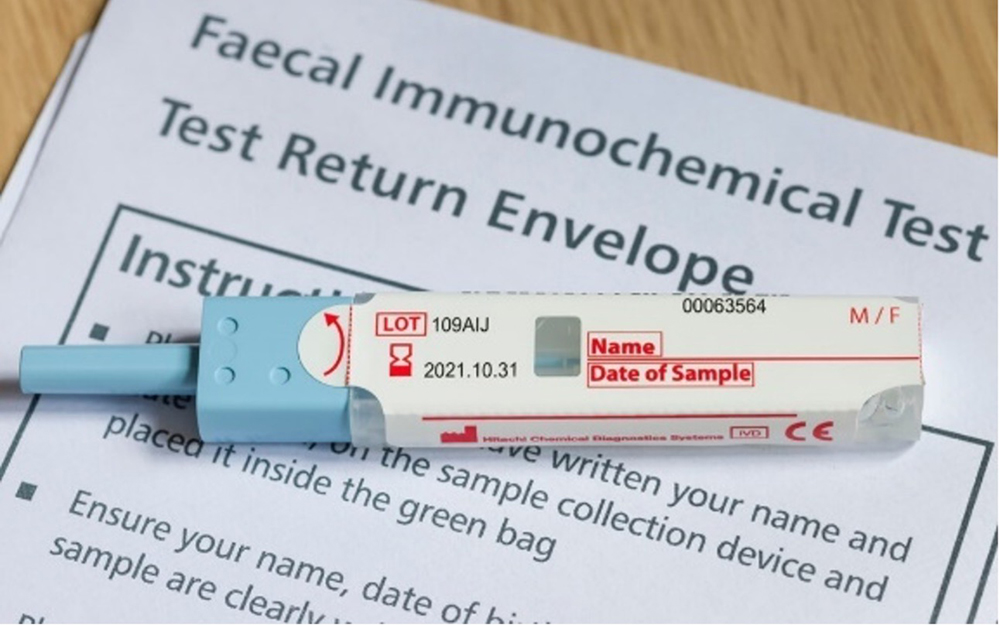New York City Health + Hospitals will test more than 50,000 colorectal cancer patients using the FIT test in 2023, a 20% increase compared to 2022
Colorectal cancer, also known as colon cancer, begins in the colon or rectum and is the second leading cause of cancer death in New York City.
March is National Colorectal Cancer Awareness Month
NYC Health + Hospitals urges New Yorkers ages 45 to 75 to get regular screenings to prevent colon cancer, detect it early, and make it easier to treat.
March 25, 2024


In honor of National Colorectal Cancer Awareness Month, NYC Health + Hospitals today announced that it will screen more than 50,000 patients for colorectal cancer in 2023 using an at-home fecal immunochemical test (FIT) . This is a 20% increase compared to 2022. FIT is an easier and less invasive test. Screening test for colorectal cancer. The health system increased patient engagement by launching a colorectal cancer screening registry. This captures all patients eligible for colorectal cancer screening and encourages primary care providers to offer testing at annual appointments. The system also increased the availability of prepaid envelopes and instructions available in 14 languages to reduce barriers for patients to collect samples and mail tests for processing.
Colorectal cancer, also known as colon cancer, begins in the colon or rectum and is the second leading cause of cancer death in New York City. NYC Health + Hospitals offers colonoscopies and FIT kits to help prevent colon cancer and find it earlier, when it's more treatable. If colon cancer is detected early, the five-year relative survival rate is about 90%. However, only 4 out of 10 colon cancers are detected this early. To make a reservation, please call 1-844-NYC-4NYC. Last year, NYC Health + Hospitals/Harlem CEO Georges H. Lecomte, MPA, FAB, RRT, launched an initiative to encourage more New Yorkers between the ages of 45 and 75 to get tested for preventable cancers. , allowed a camera to track him as he prepared for and underwent a routine colonoscopy. and destigmatizing potentially life-saving procedures. Watch Mr. Lecomte's video here. Also, read more about his FIT from Dr. Nicola Davis, Vice President and Chief Population Health Officer at NYC Health + Hospitals.
“People between the ages of 45 and 75 should be screened for colon cancer.” Nicola Davis, MD, MSc, Vice President and Chief Population Health Officer, NYC Health + Hospitals. “FIT is an easy, less invasive alternative to routine screening. The test can be performed in the comfort of your own home. We have made significant progress in improving effectiveness. We are now distributing prepaid envelopes to make it easier for patients to return their FITs, and we are enhancing data to make it easier to track patient screening and follow-up. Screening saves lives.”
“Regular colon cancer screening is the key to preventing colorectal cancer.” Andrew Wallach, M.D., Chief Physician, Ambulatory Care, New York City Health + Hospitals. “Screening tests can detect precancerous lesions and remove them before they progress to cancer. They can also detect cancer early, when treatment is most effective. I am proud of the work of our outpatient care team, which focuses on promoting healthy lifestyles and helps keep New Yorkers healthy.”
“Colorectal cancer screening in outpatient settings is paramount because early detection saves lives and significantly improves patient outcomes,” he said. Dr. Joseph Williams, Deputy Chief Medical Officer, NYC Health + Hospitals/Gotham Health. “At Gotham Health, our care teams are focused on outreach, patient education and data analysis to improve colorectal cancer screening.”
Brochure: What you need to know about colon cancer
Colon cancer often has no signs or symptoms until it has grown or spread, so it's important to get tested regularly. Symptoms of colon cancer include blood in the stool or rectum, sudden weight loss, and persistent diarrhea or constipation. If you are a New Yorker and experience these symptoms, please consult your doctor.
When you receive FIT at NYC Health + Hospitals, your provider will send a test kit (pictured above) to your home. A small amount of stool (poo) is collected using a brush and the test kit is mailed or returned to the testing facility for testing. A FIT kit should be completed by him once a year unless blood is detected in the stool. If blood is detected, a follow-up colonoscopy may be required.
A colonoscopy is a test in which your doctor inserts a flexible tube with a camera at the end (a colonoscope) into your rectum to check for signs of cancer. Doctors can find and remove most small tumors and some cancers. Colonoscopies have a low risk of complications and are usually painless because you are asleep during the procedure. Your healthcare provider at NYC Health + Hospitals will explain how to prepare for your colonoscopy.
Video: Dr. Nicola Davis, Vice President and Chief Population Health Officer, NYC Health + Hospitals, explains the difference between a fecal immunochemical test (FIT) and a colonoscopy
MIRA: Dr. Jonathan Jimenez, Ejectivo de New York Care Director, explains the difference between feces and colonoscopy
New Yorkers are more likely to get colorectal cancer if they:
- Elderly (the older you get, the higher the risk)
- Have a personal history of colon cancer or polyps
- Have a family history of colon cancer
- Have certain genetic risks, such as familial adenomatous polyposis and Lynch syndrome
- You have an inflammatory bowel disease such as ulcerative colitis or Crohn's disease
- don't exercise regularly
- have obesity
- drink alcohol
- smoke
To lower your risk of colon cancer:
- maintain a healthy weight
- Reduce intake of processed meats such as hot dogs and deli meats
- If you smoke, make a plan to quit
- regular exercise
- Reduce the amount and frequency of alcohol you drink
Most insurance plans, including Medicaid and Medicare, cover colon cancer screening starting at age 45. Talk to your NYC Health + Hospitals health care provider about your colon cancer risk and talk to your insurance company about coverage before your screening test. New Yorkers who don't qualify for or can't afford health insurance may be eligible for NYC Health + Hospitals' healthcare access program, NYC Care. For more information, call 1-646-NYC-CARE (1-646-692-2273). Not a patient at NYC Health + Hospitals? Call 1-844-NYC-4NYC (1-844-692-4692) or visit our website.
###
Media inquiries: Press Office
#043-24
About NYC Health + Hospitals
NYC Health + Hospitals is the nation's largest municipal health system, serving more than 1 million New Yorkers annually at more than 70 patient care facilities in the city's five boroughs. A robust network of outpatient, neighborhood-based primary and specialty care centers strengthens care coordination with the system's trauma centers, nursing homes, post-acute care centers, home care agencies and MetroPlus Health Plans. All of this is supported by 11 key hospitals. Our diverse workforce of more than 43,000 employees is uniquely focused on helping New Yorkers, without exception, live the healthiest lives possible. For more information, visit www.nychealthandhospitals.org and connect with us on Facebook. twitterInstagram, and LinkedIn.


